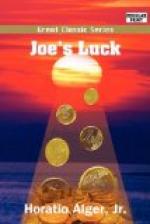His threat produced no effect upon the officer. At a signal two sailors seized him, and, despite his struggles, turned his pockets inside out.
Among the contents were found four gold eagles.
“It is my money!” exclaimed the poor German.
“You lie! The money is mine!” said Hogan furiously.
“There was a cross, which I scratched with a pin, on one piece,” said the German. “Look! see if it is there.”
Examination was made, and the scratch was found just as he described it.
“The money evidently belongs to the German,” said the officer. “Give it to him.”
“You are robbing me of my money,” said Hogan.
“Look here, my friend, you had better be quiet,” said the officer significantly, “or I will have you tied up to keep out of mischief. You are getting off very well as it is. I have no doubt you have been up to other dishonest tricks before this one.”
“That is true, sir,” said Joe, speaking up for the first time. “This is the same man who sold me a bogus ticket, two days before we sailed, for fifty dollars.”
“It’s a lie!” said Hogan. “I’ll be even with you some time, boy, for that lie of yours.”
“I don’t care for the threats of such a scoundrel as you are,” said Joe undauntedly.
“Look out for him, Joe,” said Folsom. “He will try to do you a mischief some time.”
He would have been confirmed in his opinion had he observed the glance of hatred with which the detected thief followed his young ward.
CHAPTER XI
JOE ARRIVES IN SAN FRANCISCO
At the isthmus they exchanged steamers, crossing the narrow neck of land on the backs of mules. To-day the journey is more rapidly and comfortably made in a railroad-car. Of the voyage on the Pacific nothing need be said. The weather was fair, and it was uneventful.
It was a beautiful morning in early September when they came in sight of the Golden Gate, and, entering the more placid waters of San Francisco Bay, moored at a short distance from the town.
“What do you think of it, Joe?” asked Charles Folsom.
“I don’t know,” said Joe slowly. “Is this really San Francisco?”
“It is really San Francisco.”
“It doesn’t seem to be much built up yet,” said Joe.
In fact, the appearance of the town would hardly suggest the stately capital of to-day, which looks out like a queen on the bay and the ocean, and on either side opens her arms to the Eastern and Western continents. It was a town of tents and one-story cabins, irregularly and picturesquely scattered over the hillside, with here and there a sawmill, where now stand some of the most prominent buildings of the modern city. For years later there was a large mound of sand where now the stately Palace Hotel covers two and a half acres. Where now stand substantial business blocks, a quarter of a century since there appeared only sandy beaches or mud-flats, with here and there a wooden pier reaching out into the bay. Only five years before the town contained but seventy-nine buildings—thirty-one frame, twenty-six adobe, and the rest shanties. It had grown largely since then, but even now was only a straggling village, with the air of recent settlement.




